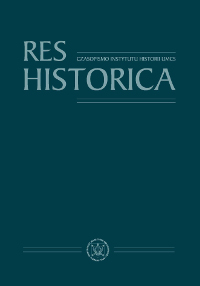On ‘Attributes of Companions or Guardians’ during Educational Travels for Young People in the Modern Era – in the Light of Apodemic Literature and Parental Instructions
On ‘Attributes of Companions or Guardians’ during Educational Travels for Young People in the Modern Era – in the Light of Apodemic Literature and Parental Instructions
Author(s): Dorota Żołądź-Strzelczyk Subject(s): History
Published by: Wydawnictwo Naukowe Uniwersytetu Marii Curie-Sklodowskiej
Keywords: preceptor; tutor; educational trips; the modern era; ars apodemica; parental instructions
Summary/Abstract: From the beginning of the 16th to the end of the 18th century, the custom of sending young people for broadly understood educational purposes was practiced throughout Europe. In travels, which sometimes lasted several years, young peregrins were accompanied by a smaller or larger, depending on the financial capabilities and rank of the family, retinue. The most important role among the people who made up this procession was the maiordomus or preceptor. In a sense, he took over parental functions during the journey. The article discusses the features and permissions of such a guardian, using for this purpose sources related to traveling. The article is based on two types of sources. The first is apodemic treatises, the second: parental instructions written for young people and their carers setting out to study from home. Apodemics are general guidelines, while instructions are specific to particular individuals and peregrinations. In the first case, treatises written by Teodor Zwinger, Samuel Neugebauer, Richard Lassels and Piotr Mieszkowski were used to show what the theoretical views on the role of supervisor were, the features that he should be characterized. The second uses the recommendations found in the instructions written by Krzysztof Radziwiłł, Jakub Sobieski, Piotr Myszkowski, Stanisław Jabłonowski, Stanisław Herakliusz Lubomirski, Anna Radziwiłłowa née Sanguszków, and Wacław Rzewuski. Both types of sources emphasized the importance of the role of a supervisor a young person was entrusted to. The parents' task was primarily to choose the right man and instruct their son to obey him.
Journal: Res Historica
- Issue Year: 2020
- Issue No: 50
- Page Range: 99-125
- Page Count: 27
- Language: English

